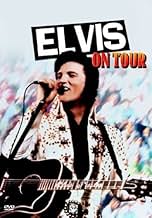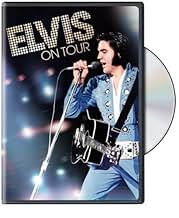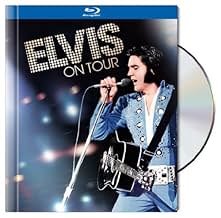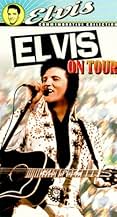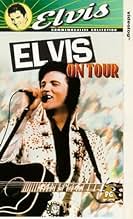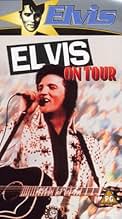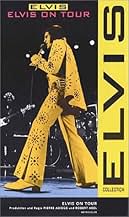Elvis on Tour
- 1972
- Tous publics
- 1h 33m
IMDb RATING
7.5/10
2K
YOUR RATING
Concert footage and offstage documentary of singer Elvis Presley.Concert footage and offstage documentary of singer Elvis Presley.Concert footage and offstage documentary of singer Elvis Presley.
- Directors
- Writers
- Stars
- Awards
- 1 win total
Estell Brown
- Self
- (as Estelle Brown)
Christopher Riordan
- Self
- (archive footage)
- Directors
- Writers
- All cast & crew
- Production, box office & more at IMDbPro
Featured reviews
I've never been a big fan of Elvis Presley, though I will admit he could certainly belt out a great song, and he also knew how to put on a good show in front of an audience. "Elvis on Tour" is without doubt a valuable rock and roll concert documentary, capturing what Elvis was like in a key part of his career. It shows that he still had considerable singing chops and magnetism.
But at the same time, something often seems to missing as he's singing, almost like he is just going through the motions. It may be because he was older, it may be because of the narcotics he was taking - I'm not sure why he isn't as energetic as he was just a few years earlier. The only portions of the documentary where he performs with genuine enthusiasm and energy is with a couple of gospel songs.
The behind-the-scenes portions of the documentary are also a bit of a letdown. We learn very little about Elvis, like what he's thinking about this entire tour, what he thinks about where he is in his career, and a number of other unanswered questions.
I will say, however, that the musical numbers in the movie are very well directed and edited; the split screen techniques bombard the viewer with a lot of information, giving the feeling of actually being at an Elvis concert. This does make up for Elvis' somewhat lack of the energy he had in the past, and push the movie up to being an okay viewing experience, though more for real Elvis fans than more casual appreciators like myself.
But at the same time, something often seems to missing as he's singing, almost like he is just going through the motions. It may be because he was older, it may be because of the narcotics he was taking - I'm not sure why he isn't as energetic as he was just a few years earlier. The only portions of the documentary where he performs with genuine enthusiasm and energy is with a couple of gospel songs.
The behind-the-scenes portions of the documentary are also a bit of a letdown. We learn very little about Elvis, like what he's thinking about this entire tour, what he thinks about where he is in his career, and a number of other unanswered questions.
I will say, however, that the musical numbers in the movie are very well directed and edited; the split screen techniques bombard the viewer with a lot of information, giving the feeling of actually being at an Elvis concert. This does make up for Elvis' somewhat lack of the energy he had in the past, and push the movie up to being an okay viewing experience, though more for real Elvis fans than more casual appreciators like myself.
Greetings again from the darkness. Thanks to the one night showing through Fathom Events, I got to see this on the big screen again for the first time since it's initial release in 1972. For the 75th Anniversary, an introduction was added that included some clips and interviews. I found it most interesting to get a behind the scenes look at how the film was put together, and the roles of Robert Abel, Pierre Adidge and Martin Scorcese.
The film itself won a Golden Globe for best documentary and it's easy to see why. It provides a look at Elvis on the road ... and a peek at what he was like as a man. In the new intro, Priscilla says "Elvis didn't just sing a song". She is so right. Sure, he had an amazing voice. And yes, he was an incredibly charismatic stage performer. Obviously, he was a handsome man and sex symbol of the times. But what the film reminds us is that he was a musician ... a man who felt and loved the music.
For anyone who doesn't "get" Elvis or thinks he was just some old guy in a sequined jumpsuit, this is the film to watch. Upon its original release, Rolling Stone magazine's headline read "Finally, the first Elvis movie". The montage of his early years and crowd shots of his later years, show just what an impact he had on his fans. There was, and still is, a connection to those who were captivated by the man and his songs. He truly was a musical and social phenomenon.
Seeing him carry the burden of being ELVIS is very interesting. While the songs and performances are fun to watch, the real value here is in the backstage portions. That's where we see that he lived for the music. How else can you explain the voluminous recording library he left behind in less than 20 years. Despite the military service, pressures of fandom, and his personal issues, he continued recording songs that we can enjoy today. Compare this to the Rolling Stones, whose careers have lasted more than twice as long as Elvis! While he was not at his physical peak on this tour, he was 37 years old and in decent condition. What is obvious is that the VOICE is still there when he wants it. The two best moments are when he records "Separate Ways" and then when he performs "Trilogy". That is the proof that the special gift never left him.
It's difficult to watch this and realize that Elvis was dead 5 short years later. It really affects how you view his father, Vernon, who we see backstage and watching his son perform. It is also painful to see guys like Joe Esposito and Sonny and Red West kissing up to Elvis, now that we know they would go on to publish trash stories about him their golden goose was dead.
The film truly captures a part of history and a glimpse at a fascinating man, who really was the first mega-superstar who became bigger than life.
The film itself won a Golden Globe for best documentary and it's easy to see why. It provides a look at Elvis on the road ... and a peek at what he was like as a man. In the new intro, Priscilla says "Elvis didn't just sing a song". She is so right. Sure, he had an amazing voice. And yes, he was an incredibly charismatic stage performer. Obviously, he was a handsome man and sex symbol of the times. But what the film reminds us is that he was a musician ... a man who felt and loved the music.
For anyone who doesn't "get" Elvis or thinks he was just some old guy in a sequined jumpsuit, this is the film to watch. Upon its original release, Rolling Stone magazine's headline read "Finally, the first Elvis movie". The montage of his early years and crowd shots of his later years, show just what an impact he had on his fans. There was, and still is, a connection to those who were captivated by the man and his songs. He truly was a musical and social phenomenon.
Seeing him carry the burden of being ELVIS is very interesting. While the songs and performances are fun to watch, the real value here is in the backstage portions. That's where we see that he lived for the music. How else can you explain the voluminous recording library he left behind in less than 20 years. Despite the military service, pressures of fandom, and his personal issues, he continued recording songs that we can enjoy today. Compare this to the Rolling Stones, whose careers have lasted more than twice as long as Elvis! While he was not at his physical peak on this tour, he was 37 years old and in decent condition. What is obvious is that the VOICE is still there when he wants it. The two best moments are when he records "Separate Ways" and then when he performs "Trilogy". That is the proof that the special gift never left him.
It's difficult to watch this and realize that Elvis was dead 5 short years later. It really affects how you view his father, Vernon, who we see backstage and watching his son perform. It is also painful to see guys like Joe Esposito and Sonny and Red West kissing up to Elvis, now that we know they would go on to publish trash stories about him their golden goose was dead.
The film truly captures a part of history and a glimpse at a fascinating man, who really was the first mega-superstar who became bigger than life.
Elvis had gotten chubby but he wasn't fat like he was when he died. Elvis still looks decent, and is in top vocal form. What "That's the Way It Is" did by showing Elvis's life in rehersal, this one did by showing Elvis's life on the road. It was good to see Elvis at or still near the peak of his performing career.
This is Elvis at his total peak as a stage performer and ultimate 20th Century musical icon. The King has often been criticised at this point in his private life and career for one aspect or another - the separation from Priscilla, the reliance on prescribed medication, the extra pounds added to his waistline, the abundance of cover versions in his stage act, etc., etc. But what people fail to realise - here was a man who naturally was suffering with a certain amount of stress at this particular phase of his showbiz and personal life, especially having contracted glaucoma and having to cope with a gruelling touring schedule. Elvis might have been carrying a few extra pounds since MGM filmed him on and off stage in his previous documentary, but he still looked in peak physical condition and could certainly move and shake better than any would-be contender to his throne - check out 'Polk Salad Annie', the opening credit montage of 'Johnny B. Goode' and the energetic displays of on-stage Karate routines. Elvis had just recorded some future classic hits at this point when the movie was being filmed namely 'Always On My Mind' and 'Burning Love'. The other songs that had been certified global hits just before filming commenced for "On Tour" were 'An American Trilogy' and 'Until It's Time For You To Go'. The inspirational album 'He Touched Me' had just given Elvis his second grammy award in five years, and three of the gospel numbers on the album were to be featured rehearsal performances in "Elvis On Tour". A couple of months later The King embarked on another concert performance milestone with a full weekend of sell-out shows at New York's Madison Square Garden - John Lennon, George Harrison, David Bowie and Paul Simon were in attendance. The album recording of the Saturday night concert at The Garden achieved gold status. Before the pinnacle of the record-breaking 'Aloha From Hawaii' Satellite Concert in January 1973, "Elvis On Tour" had been nominated for a Golden Globe award for Best Documentary - it ended up as the winner. So, as anyone can see here, there were so many high points that are frequently overlooked in the year Elvis1972. And, as for performing such covers as 'Proud Mary', 'Bridge Over Troubled Water', and 'I Can't Stop Loving You' - he did them His way!
The final era of the 20th Century's most respected Rock icon-Elvis Aaron Presley is captured here by MGM doing what he did best of all: Performing to various live audiences around the U.S.
It's almost a couple of years on from the first MGM filmed documentary about the Man and his live act, 'That's The Way It Is', and 'On Tour' is filmed in a different retrospective. In this one there aren't as many as those annoying fan interviews and interruptions and mainly concentrates on the different performances that Elvis manufactures to create his touring Stage-Show at this time.
Some of the old favourites are in there such as 'Johnny B.Goode'(Great opener to the film!), 'Polk Salad Annie'(Performed somewhat faster-wow!), 'Love Me Tender'(Nice touch showing some of the scripted movie kiss scenes!), 'Lawdy Miss Clawdy'(A total free-for-all with Elvis and the Band-magnetic!), 'I Got A Woman'(Amen to this!) and the finale sound of 'Can't Help Falling In Love'(Cape-wielding showstopper!).
New tunes 'The King' was bringing into his act at this particular time included 'Until It's Time For You To Go', 'Burning Love', 'An American Trilogy', 'You Gave Me A Mountain' and 'Never Been To Spain', and it's all a delight to hear and see him perform these in his own special, voice-to-the-limit, inimitable way.
After 32 previous attempts at trying to get himself recognised on film for the most part as a serious actor it's justifying that Elvis didn't need to act to do this, as the Golden Globe came winging it's way to 'On Tour' for Best Movie Documentary. Elvis appears slightly more weighty than in 'That's The Way It Is', with his hair somewhat longer and sideburned. The undeniable animal magnetism and aurora and God-gifted musical talent of this human being, which the film also sets out to portray, are here in evidence as a filmed testimony to any young, up and coming Singers even to this day who are trying to cut a niche for themselves in the unpredictable world of Pop Music-At the end of the day it's sheer hard work, just like in any job you may hold down, that helps to get you established and recognised for a lengthy period of time in the industry.
Elvis in 'On Tour' is dogged with personal problems and obviously reliance on prescription drugs are quite evident in some scenes, which ironically add to the sad and touching biography that is being told before you on the screen. Unlike 'That's The Way It Is', Elvis doesn't seem to enjoy himself as much surrounded by his so-called buddies, and it seems as though Vernon (his father)is more present than ever which certainly gave Elvis that family connection that he no doubt craved at this point, especially being on the road for weeks at a time. Infact, the only time Elvis seemed happy apart from on stage was when he was with his band in private singing many a gospel number.
Nevertheless, fan or non-fan, you'll love this and it's a unique testimony to a Performer who was being filmed for his official final movie in his career. The greatest triumph was still yet to come after this movie, in the form of his record-breaking Satellite TV Special the following year-'Aloha From Hawaii'. In this Special Elvis would never look and sound this consistently good again, but that was another time and another place...
It's almost a couple of years on from the first MGM filmed documentary about the Man and his live act, 'That's The Way It Is', and 'On Tour' is filmed in a different retrospective. In this one there aren't as many as those annoying fan interviews and interruptions and mainly concentrates on the different performances that Elvis manufactures to create his touring Stage-Show at this time.
Some of the old favourites are in there such as 'Johnny B.Goode'(Great opener to the film!), 'Polk Salad Annie'(Performed somewhat faster-wow!), 'Love Me Tender'(Nice touch showing some of the scripted movie kiss scenes!), 'Lawdy Miss Clawdy'(A total free-for-all with Elvis and the Band-magnetic!), 'I Got A Woman'(Amen to this!) and the finale sound of 'Can't Help Falling In Love'(Cape-wielding showstopper!).
New tunes 'The King' was bringing into his act at this particular time included 'Until It's Time For You To Go', 'Burning Love', 'An American Trilogy', 'You Gave Me A Mountain' and 'Never Been To Spain', and it's all a delight to hear and see him perform these in his own special, voice-to-the-limit, inimitable way.
After 32 previous attempts at trying to get himself recognised on film for the most part as a serious actor it's justifying that Elvis didn't need to act to do this, as the Golden Globe came winging it's way to 'On Tour' for Best Movie Documentary. Elvis appears slightly more weighty than in 'That's The Way It Is', with his hair somewhat longer and sideburned. The undeniable animal magnetism and aurora and God-gifted musical talent of this human being, which the film also sets out to portray, are here in evidence as a filmed testimony to any young, up and coming Singers even to this day who are trying to cut a niche for themselves in the unpredictable world of Pop Music-At the end of the day it's sheer hard work, just like in any job you may hold down, that helps to get you established and recognised for a lengthy period of time in the industry.
Elvis in 'On Tour' is dogged with personal problems and obviously reliance on prescription drugs are quite evident in some scenes, which ironically add to the sad and touching biography that is being told before you on the screen. Unlike 'That's The Way It Is', Elvis doesn't seem to enjoy himself as much surrounded by his so-called buddies, and it seems as though Vernon (his father)is more present than ever which certainly gave Elvis that family connection that he no doubt craved at this point, especially being on the road for weeks at a time. Infact, the only time Elvis seemed happy apart from on stage was when he was with his band in private singing many a gospel number.
Nevertheless, fan or non-fan, you'll love this and it's a unique testimony to a Performer who was being filmed for his official final movie in his career. The greatest triumph was still yet to come after this movie, in the form of his record-breaking Satellite TV Special the following year-'Aloha From Hawaii'. In this Special Elvis would never look and sound this consistently good again, but that was another time and another place...
Did you know
- TriviaMartin Scorsese was the montage supervisor for this documentary.
- Quotes
Elvis Presley: [introducing band members to audience] "... and the guy that gives me my water and my scarves and so forth, his name is Charlie Hodge."
- Alternate versionsDue to music licensing issues, substitutions were made for the 2010 DVD/Blu-Ray release. The opening song, Johnny B. Goode is replaced with Don't be Cruel, while the Also Sprach Zarathustra (Theme from 2001 : L'Odyssée de l'espace (1968)) opening bars have been replaced with a generic piece of music.
- ConnectionsEdited from Salut, les cousins (1964)
- SoundtracksSee See Rider
Traditional, also credited to Ma Rainey
Arranged by Elvis Presley
Performed by Elvis Presley
- How long is Elvis on Tour?Powered by Alexa
Details
- Release date
- Country of origin
- Language
- Also known as
- Elvis on Tour in Multiple-Screen
- Filming locations
- Production companies
- See more company credits at IMDbPro
Box office
- Budget
- $600,000 (estimated)
- Gross US & Canada
- $587,818
- Gross worldwide
- $587,818
- Runtime1 hour 33 minutes
- Aspect ratio
- 2.35 : 1
Contribute to this page
Suggest an edit or add missing content





